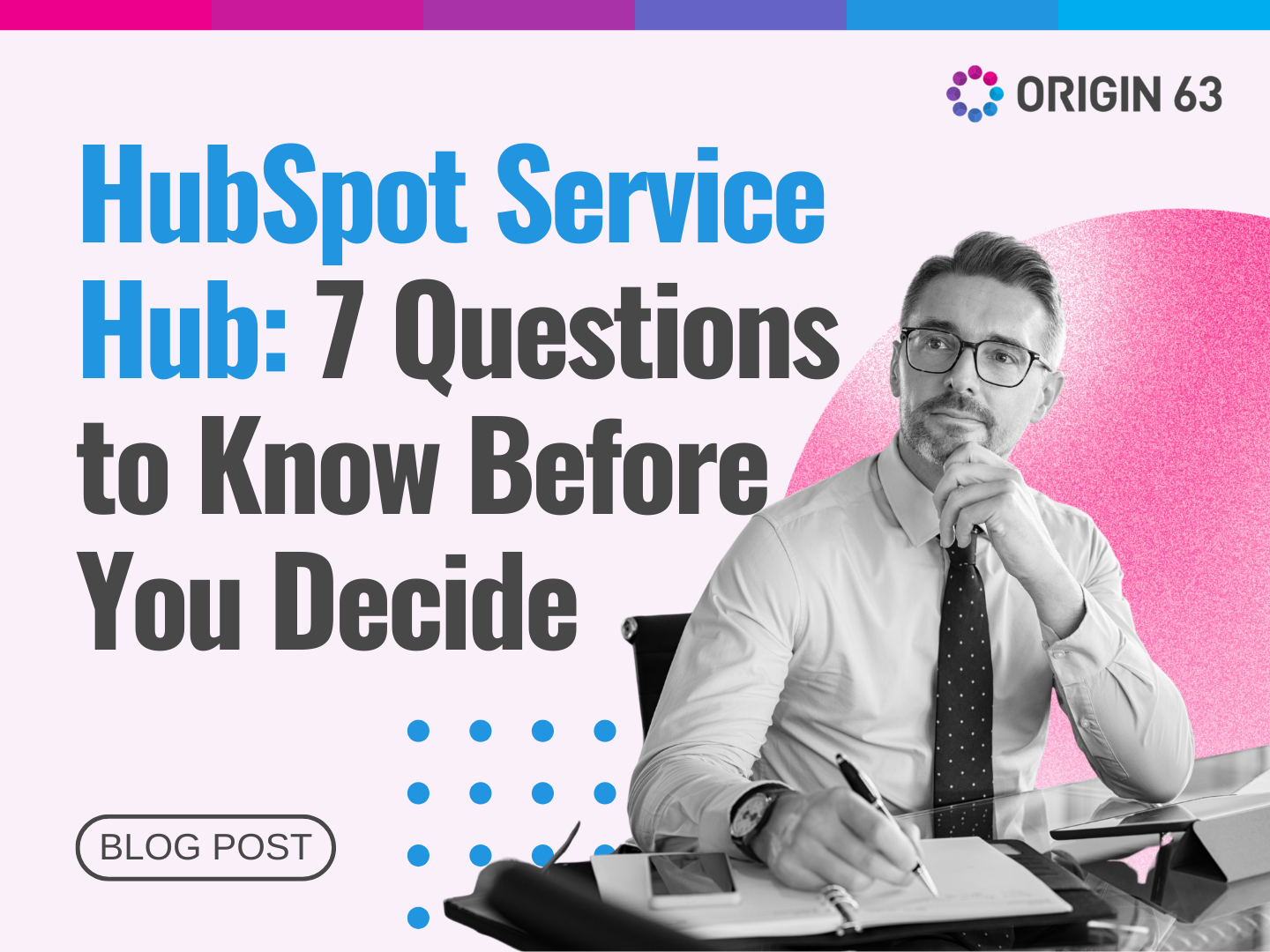Have you ever contacted a company for help, only to be bounced between departments, repeating your issue over and over? This kind of poor experience can leave customers feeling unheard and undervalued.
With its skills-based routing feature, HubSpot’s Service Hub ensures every customer inquiry gets to the right person the first time, reducing wait times and eliminating unnecessary transfers.
Let’s discuss how skills-based routing works, why it’s a game-changer for your team, and how you can set it up in HubSpot to delight your customers and optimize your workflows.
What Is Skills-Based Routing (and Why It Matters)

Skills-based routing is like a matchmaker for customer inquiries. Instead of sending questions or issues to just anyone, it connects customers with team members who have the specific skills or knowledge needed to help. This ensures problems are solved quickly and effectively.
Here’s why investing in skills-based routing makes sense:
Happier Customers
Customers love fast, accurate responses. Studies show that 73% of customers expect companies to understand their needs and offer personalized support. Skills-based routing delivers on that expectation.
Efficient Teams
When tasks go directly to the right person, your team spends less time figuring out who should handle them. That means faster and more efficient service. 86% of consumers will pay more for businesses with a good customer experience.
Better Resource Utilization
Skills-based routing ensures every team member works on tasks they’re good at, which boosts confidence and productivity. 31% of customers say having a knowledgeable support agent is the most important factor of good customer service.
How to Implement Skill-Based Routing in HubSpot
The skills-based routing tool in HubSpot's Service Hub Enterprise helps get customer questions to the right team members automatically.
It looks at what each support agent is good at (like speaking Spanish or fixing technical issues) and sends tickets their way. This means customers get help faster, and your team can work more efficiently.
Here's what you'll need to do:
1. Start with Defining Skills
The first step is to identify what skills your team members bring to the table. These could be technical expertise, language fluency, or specialized knowledge in areas like billing or e-commerce. For example:
- Product knowledge: Someone who knows your product inside out.
- Language fluency: Agents fluent in Spanish or French.
- Technical expertise: Those skilled in troubleshooting complex systems.
Once you’ve mapped this out, head to Settings in HubSpot, then navigate to Routing and select the Skills tab. Here, you can add or edit skills. HubSpot even includes default options, like supported languages, which you can build on with custom skills tailored to your business.
2. Assign Skills to Your Team
Alt Image Text: Assign skills to your team, Skill-based routing
Next, you’ll want to assign these skills to the right people. This is where you match your team’s strengths to the skills you just created. For example:
- Assign “Spanish proficiency” to Maria, who’s fluent in the language.
- Tag “Advanced troubleshooting” to John, your go-to tech wizard.
To do this, go to Users & Teams in HubSpot’s settings. Edit a user’s profile and navigate to the Skills tab, where you can customize their primary and secondary language fluencies and add custom skills.
Main languages are for complete fluency, while secondary ones are great for conversational abilities.
3. Build Smart Routing Rules
Now comes the fun part: setting up the rules that decide who gets what. Think of routing rules as the backbone of your system—they ensure every ticket lands in the right hands.
Start by creating a ruleset in the Routing section. Choose a channel, like email or chat, and define the criteria for routing. For example:
- If a ticket with the property Language = Spanish comes in, it should go to Maria.
- If the Ticket Type = Technical Support, send it to John.
You can combine filters with AND/OR logic to get specific. For instance, you might route inquiries tagged as “Billing” AND in “English” to your finance-savvy reps while routing more general tickets based on language alone.
4. Test and Fine-Tune
With your rules in place, it’s time to test them out. Submit a few sample tickets and check if they’re being routed as expected. HubSpot processes rules in order, so make sure the most common scenarios are covered first.
You can reorder rules by dragging them into a different priority or tweak conditions to fix gaps if you need to make changes. And if a ticket doesn’t meet your rules, HubSpot will fall back on your default routing rule.
5. Keep an Eye on Performance
Alt Image Text: Support volume analytics, Keep an eye on performance
Setting up skills-based routing isn’t a one-and-done process. You’ll want to review how it’s performing regularly. Are customers getting faster responses? Are specific tickets taking too long to resolve?
Use HubSpot’s analytics tools to track these metrics, and don’t forget to check in with your team for feedback—they’ll often spot areas for improvement that data alone can’t reveal.
You'll ensure your routing system stays efficient and effective by continuously refining your setup, adding new skills as your team grows, and tweaking rules as needed. Before you know it, your team will run like clockwork, and your customers will notice the difference!
Use Cases and Applications of Skills-Based Routing
Skills-based routing is versatile and can make a huge difference across various teams, from customer service to sales and technical support.
Ensuring the right people handle the right inquiries helps you deliver faster responses, provide better customer experiences, and empower your team to do their best work. Let’s break it down with examples tailored to specific roles.
1. For Customer Service
Customer service teams thrive on efficiency and empathy. Skills-based routing ensures that customers aren’t passed around between departments but instead reach the person who can resolve their issue immediately.
Imagine a customer emails your help desk with a billing question. Instead of going into a general queue and being answered by someone unfamiliar with billing, the system routes it directly to a rep with finance expertise.
This approach dramatically cuts response times and reduces customer frustration. Let’s say you run an online subscription service.
- A customer writes in about a discrepancy in their monthly bill.
- The system identifies this as a “Billing Inquiry” and routes it to Sarah, who handles billing questions daily.
- Sarah reviews the customer’s account and resolves the issue without having to forward the ticket elsewhere.
This streamlined approach saves time and builds trust with customers, as they see their concerns are being handled by someone knowledgeable.
2. For Sales Teams
Alt Image Text: Sales representatives talking to a customer, Skill-based routing for sales teams
Timing and expertise are everything in sales. Skills-based routing helps ensure leads are assigned to the salesperson best equipped to close the deal, increasing your chances of conversion.
Let’s say a lead fills out a form indicating they’re interested in advanced features of your software. Instead of being routed to a junior rep, the lead is assigned to a seasoned salesperson specializing in complex product demos and high-value deals.
This precision shortens the sales cycle and leaves the lead feeling confident in your team’s ability to understand their needs.
3. For Technical Support
Technical support often deals with complex, high-stakes issues that require specialized knowledge. Skills-based routing ensures these problems go directly to the experts, reducing escalations and improving resolution times.
When a customer submits a ticket about a system error, the system routes it to a technical support agent who specializes in troubleshooting that specific issue. The result? A quicker resolution and a happier customer.
Let’s take a SaaS company as an example:
- A customer reports that their software keeps crashing when exporting data.
- The system tags the ticket as a “High-Level Technical Issue” and routes it to Priya, a support engineer specializing in debugging export-related problems.
- Priya identifies the issue and resolves it within an hour without the need for escalations or lengthy back-and-forth communication.
Connecting technical issues to specialized agents lets you improve resolution times and demonstrate your team’s competence and reliability.
How to Monitor and Optimize Skills-Based Routing
Setting up skills-based routing is just the beginning. To truly reap its benefits, you must monitor how it performs and continually refine your system.
The more you fine-tune, the smoother your operations will run and the happier your customers and team will be. Here’s how to make sure your routing setup stays on point.
1. Track What’s Working
Alt Image Text: HubSpot Service Analytics, Track what’s working
The first step in optimization is knowing what’s working—and what isn’t. HubSpot’s built-in analytics give you insights on how to evaluate your skills-based routing setup.
Leverage HubSpot’s reporting tools to monitor key metrics like:
- Response Times: How quickly are inquiries being addressed? Faster responses often indicate that tickets are being routed to the right people.
- Resolution Rates: Are issues being solved on the first attempt, or are they bouncing between team members?
- Customer Satisfaction (CSAT) Scores: Are customers happy with the support they’re receiving?
Say your CSAT scores are consistently high for billing inquiries but low for technical issues. This might indicate that your tech tickets aren’t quickly reaching the right experts. Use this data to adjust your routing rules and improve the experience for those customers.
2. Keep Improving
Optimization isn’t a one-time effort. Teams grow, skills change, and customer needs evolve. You should focus on keeping your routing setup in sync with these shifts.
Review your team’s skills periodically. For example, if a new hire specializes in SEO, ensure their skill is added and relevant inquiries are routed to them.
Adjust rules as you notice trends. If a particular ticket type always needs reassignment, consider creating a rule to route it directly to the right person or team.
As your business expands, you might need to create new categories of skills. For example, a growing international customer base could mean adding new language skills for support.
For instance, your routing rules were working well last year, but now your business has grown, and you’re getting a lot more inquiries about a new product feature. Updating your rules to route these inquiries to a specific product expert will ensure these tickets are handled efficiently.
3. Get Feedback
Data isn’t the only thing that can guide your improvements. Direct feedback from your team and customers is equally valuable for identifying bottlenecks or gaps.
First, check in with your team during regular meetings or through surveys. Ask questions like:
- Are tickets being misrouted?
- Are some tasks overwhelming specific team members?
Then, use feedback forms, surveys, or follow-up emails to understand your customer’s experience. Questions like, “Was your issue resolved quickly?” can highlight areas where routing might need adjustments.
If multiple team members report that tickets tagged as “Technical Issue” are too vague to route effectively, consider refining the criteria or splitting that category into more specific ones, like “Software Bugs” or “System Errors.”
Start Using HubSpot’s Skills-Based Routing
Skills-based routing ensures every inquiry lands in the right hands. You can deliver faster resolutions, happier customers, and more empowered teams.
How to make it work? Stay proactive. Use HubSpot’s analytics to track performance, refine your rules, and gather feedback from your team and customers.
With consistent monitoring and optimization, skills-based routing becomes more than a tool—it’s a cornerstone of excellent service and streamlined operations.
So, take the time to set it up thoughtfully and commit to continuous improvement. The payoff is a system that grows with your business and delivers stellar results every step of the way.
Let Origin 63 Help You Maximize HubSpot
At Origin 63, we specialize in helping businesses like yours get the most out of HubSpot. From customizing routing rules to designing strategies that align with your goals, we’ll ensure you’re set up for success.
Let’s partner to build a smarter, more efficient system tailored to your needs. Contact us today to see how we can help!














.png?width=90&height=90&name=Arrows%20Partner%20Badge-test%20(1).png)

